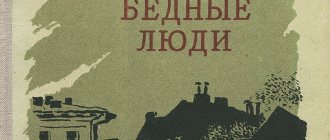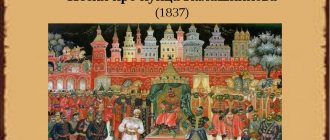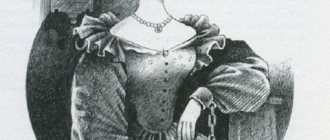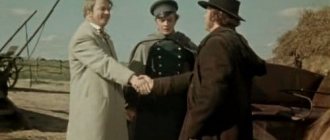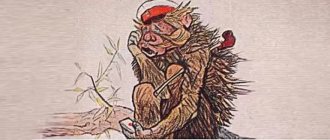Characters[edit]
- Guy Montag, the main character. He works as a “firefighter” (a specialist in eliminating potential fire hazards in the world of the near future, in fact - book depositories and private libraries). After the death of Clarissa McClellan and the woman who refused to leave the house, he reconsidered his views. After turning right, on the advice of Faber, he joined the “living books”
. - Mildred, Guy's wife. An actress who takes part in TV plays and constantly wears her “shells”. She doesn't share Montag's opinion that books should be preserved, and towards the end she snapped and ratted out her husband over keeping books
. - Clarissa McClellan, a very beautiful young girl, is his dreamy neighbor. Her romantic views are reminiscent of the hippie generation that was just emerging at the time the novel was written. Many consider her crazy because she wanders around the town, asks awkward questions, doesn’t watch TV, is interested in nature, and strives to talk about feelings and thoughts. “I’m seventeen years old and I’m crazy. My uncle claims that one thing inevitably accompanies the other.” The generally short-lived relationship, which did not culminate in any love affair, nevertheless completely changed the life of the main character, who before meeting her was a faithful servant of the existing system, and then she died under car wheels
. The uncle is just like Clarissa, a dissenter, she constantly quotes him.
a book for life (where is this indicated?) (The fire chief himself speaks about this,
however, it later turns out that it was all just a test
), and Beatty directly admits that before the burning of houses he looked into many. It must be assumed that the fireman's memory is eidetic. Or, as an option (from unbridled guesses), his memory is simply good, and he burned the works he quoted more than once, and before destruction he once again looked through and re-read some passages.
- Suicidal self-confidence - Beatty. He thought that the protagonist was playing a joke on him. At least that's what it looked like. Montag later comes to the conclusion that Beatty purposefully committed suicide at his hands.
Summary of the novel Fahrenheit 451
It is quite difficult to analyze the novel. Therefore, it is better to begin an analysis of what the meaning of the work is in the book Fahrenheit 451 with a brief retelling of the plot.
The book takes place in the near future, in which a totalitarian regime reigns. The main character of the novel is fireman Guy Montag. Only its functions do not include saving buildings and people from fire, but, on the contrary, burning books and the houses of the people who keep them. The firefighters are helped in this by a robotic dog that can identify dissidents by smell.
Interesting! Bradbury came up with the idea for the novel after watching newsreels showing Nazis burning books by unwanted authors.
Guy is married. His wife Mildreth spends her days in front of the TV walls with shell headphones in her ears.
Guy liked his job. He never understood people who risked life and freedom for the sake of books. But one day the fireman met a young neighbor, Clarissa, who loved to wander the streets, think, inhale smells, and admire plants. Having heard from the girl that in the past firefighters extinguished the fire, and did not start it, Guy did not immediately believe it.
But the conversation with Clarissa caused confusion in the hero’s soul. And after the owner of the house chose to burn down along with her library during the next call, the fireman decided to steal one book, hiding it behind a ventilation pipe.
Soon Clarissa disappeared. Guy learned from his wife that the girl had been hit by a car and her family had left.
Montag's boss, Firemaster Beatty, begins to suspect his subordinate of breaking the law. Coming to Guy, he gives him a lecture on the principles of the structure of society. In his speech, Beatty explains to the hero of the novel Fahrenheit 451 the meaning of destroying books. This is necessary so that all people think the same, do not stand out, and do not feel smarter or stupider than others. According to Beatty, this is happiness.
Rebirth
After the firemaster leaves, Montagie confesses to his wife that he was in possession of the books. Mildred, in a panic, tried to burn them in the oven, but Guy asks her to just listen, sitting down to read aloud.
After spending the whole day reading books, Montag understood little. Therefore, I decided to turn to Professor Faber for help. The hero had long known about the professor’s reading of books, but never reported him.
The professor gave Guy special headphones that transmit and receive signals for communication.
Interesting! Bradbury's novel describes innovations that were not available at the time the book was written. “Shells”, 3D images, ATMs appeared long after the work was published.
Returning home, the fireman learned about the beginning of the war and mobilization. The senseless chatter of his wife with her friends infuriated the hero and, forgetting about the risk, he began to read a book to them.
The next day, Guy was sent to another call. The target for burning turned out to be his own house, and his wife reported on the fireman.
After destroying the house, Montag turned the flamethrower on Beatty and burned him down. Having stunned his colleagues, Guy escaped. But the mechanical dog managed to get a needle into the hero’s leg.
Montag arrived at Faber's house. The professor gave the fireman the coordinates of people - adherents of books, hiding from the police.
To throw the robot dog off the scent, Guy had to dive into the river. Having climbed out of the river, Montag came across several members of an organization consisting of several thousand people. They kept the books they read in their memory, hoping that one day their knowledge would be useful.
The next day the war began, which ended very quickly. Before the eyes of Guy and his comrades, the city was instantly destroyed.
The heroes decided to return to help the survivors. On the way, the former fireman tried to remember what he had read so that he could pass it on to others.
Plot[edit]
A soured relationship with his wife and dissatisfaction with life against the backdrop of cruelty encountered at work force him to have a different attitude towards his own place in the world. One day he meets Clarissa and begins to understand that there is another life. Meeting Faber completely shakes his faith in the existing order of things. He steals several books while working and reads in secret, which does not go unnoticed by his wife, who first complains to his boss, and after his unsuccessful re-educational work, even makes an official denunciation. Montag’s worldview is also shaped by his meeting with his wife’s friends, who are ardent supporters of abortion, cesarean sections and who are something like images of the “ideal soldier’s wife.” This point is often censored in a variety of countries, however, oddly enough, in the USSR the novel was published without cuts. Then there is the death of Clarissa, who, according to Beatty, was hit by a car, a meeting with a woman who refused to leave the house flooded with kerosene and struck a match to burn herself along with the books, and the appearance of a cyber-monster dog hunting criminals. After these events, Guy withdraws into himself and immerses himself in reading and dialogues with Faber.
One day, arriving on call, he is horrified to learn that he has come to burn down his own house with the books that he brought to himself. After burning the house, Guy burns the fireman and the robot dog, stuns two other firefighters, and with this, everyone crosses the moral horizon of events, effectively finding themselves outlawed. He is being hunted on television, but Faber's help allows him to leave the city unharmed (ironically, destroyed a little later, just a few hours later, by a nuclear bomb). Having traveled by rail, Guy finds a group of marginal travelers, each of whom is essentially a “living book”, literally remembering the contents of one book for posterity, to which he joins.
It is the author’s self-irony about how in the future the authors who have “picked up tops” are authorities for new generations, a kind of “dwarfs on the shoulders of giants” according to Swift.
Paths[edit]
- Bonfires made from books are a codifier in art. Once upon a time, firefighters extinguished the fire, now they are starting it...
- America will take over the world - America started and won six atomic wars. It was not possible to capture everything - the survivors gained strength to respond. World War III: For the United States, local nuclear wars are commonplace. But the last one, truly global, turned out to be too much for even them.
- Political correctness:
| « | Let us now take the question of various small groups within our civilization. The larger the population, the more such groups there are. And beware of offending any of them - dog or cat lovers, doctors, lawyers, merchants, bosses, Mormons, Baptists, Unitarians, descendants of Chinese, Swedish, Italian, German immigrants, Texans, Brooklynites, Irish, residents of Oregon or Mexico City. The heroes of books, plays, and television programs should not resemble truly existing artists, cartographers, or mechanics. Remember, Montag, the wider the market, the more carefully conflicts must be avoided. All these groups and small groups contemplating their own navel - God forbid they should somehow be offended! Malicious writers, shut your typewriters! <…> People of color do not like the book “Little Black Sambo”. Burn it. White people hate Uncle Tom's Cabin. Burn that too. Someone wrote a book about how smoking predisposes you to lung cancer. Tobacco manufacturers are panicking. Burn this book. We need serenity, Montag, calm. Away from everything that gives rise to anxiety. Into the oven! | » |
| — From Beatty's speech | ||
- By the way, magazines are allowed (newspapers seem to be too), as stated in the same scene where Beatty delivers the above monologue. But magazines, roughly speaking, are of three types - erotic, women's and comics, i.e., comparable to radio and television. The fireman's words: “But the reader knew perfectly well what he needed, and, swirling in a whirlwind of fun, he kept the comics for himself. And, of course, erotic magazines.” The permitted literature also includes the fire service regulations. The British film shows Montag reading a newspaper, which is either a comic book or a graphic novel.
- Well, yes, but erotic magazines, of course, cannot offend anyone.
- As an option from a series of unbridled guesses, there is almost no one to offend. Most people prefer to have fun.
- Everything went too much like this. They gave me a loaded flamethrower and ordered me to burn it. He burned the books, the house and someone else.
- Speak in quotes - Firemaster Beatty. Every speech is a quotation. The irony is that in a world of mindless consumption, only firefighters have the right to pick up and read one
book in their lifetime, and Beatty directly admits that before burning down houses, he looked into many. One must assume that the fire chief has an eidetic memory... The fire chief is “full of quotes” and does not hide it. In addition, “only fire chiefs still remember the history of firefighting.”
, thereby becoming a clear example of what books do to people.
- Although for Montag himself it’s all around to the right.
| « | “She said Ridley.” She said something strange when we entered the house: “Be of good courage, Ridley.” And something else... Something else... - “By the grace of God we will light a candle today in England that I believe they will never extinguish,” said Beatty. ...A man named Latimer said this to a man named Nicholas Ridley when they were being burned alive at the stake for heresy at Oxford on the sixteenth of October, one thousand five hundred and fifty-five. | » |
| — Latimer and Ridley are Protestants who were burned under Mary I when she restored the Catholic faith in England. | ||
- They have simplified and vulgarized - everything that becomes widespread is reduced.
| « | - Try to imagine a person in the nineteenth century - dogs, horses, carriages - a slow pace of life. Then the twentieth century. The pace quickens. Books are shrinking in volume. Abridged edition. Retelling. Extract. Don't smear! Hurry to the denouement! “Hurry to the denouement,” Mildred nodded her head. — The works of the classics are reduced to a fifteen-minute radio broadcast. Then even more: one column of text, which you can run through in two minutes, then another: ten to twenty lines for an encyclopedic dictionary. I'm exaggerating, of course. Dictionaries existed for reference. But there were quite a few people whose acquaintance with “Hamlet” - you, Montag, of course, know this title well, but for you, Mrs. Montag, it’s probably just a vaguely familiar sound - so, there were a lot of people whose acquaintance with “Hamlet” was limited to one page of a brief retelling in the collection, which boastfully declared: “Finally you can read all the classics! Keep up with your neighbors." Do you understand? From nursery straight to college and then back to nursery. This is the intellectual standard that has prevailed for the last five centuries or more. | » |
| — Beatty explains the point to Montag. | ||
- Storing forbidden information - books have become such information, the storage of which (regardless of the content) is subject to severe punishment.
- Suicide epidemic - the orderlies mention that not only the protagonist’s wife had an incident with drinking the entire bottle of sleeping pills.
- A nuclear explosion is scary - the ending puts the pedal to the metal: although from a technical point of view it is absolutely implausible, it hits the nerves epically.
Beatty and other characters
Beatty is a character who was killed by Guy's flamethrower. He was Guy's boss, an adaptable and very sensible man. Like Faber, the hero hates books.
Mildred's friend is a woman who reports all of Guy's crimes to the authorities together with his wife. She herself is not married.
The work shows a world that is full of unusual events . Everything around is drowning in madness. People living in it are strictly prohibited from touching books. Anyone who decides to break the ban receives punishment. Fire service workers destroy tons of books in the fire so that no one has the desire to pick them up and read them. Saving people from burning houses fades into the background. The world in the novel is described as something terrible. Absurdity and crazy things happen in it all the time.
Adaptations[edit]
- English-French film of the same name from 1966. Here Julie Christie played Clarissa and Linda. The authors wanted to show some kind of contrast between them, but Bradbury did not like this idea. Informer - boxes for denunciations are installed in special places. Montag and Clarisse are watching a man trying to denounce him. At the same time, they think about what motivates him: love for the law or the desire to harm someone.
- To wrap things up in the adaptation - Montag is a more experienced fireman (major - if not, correct him), Clarissa and her family are quite active underground fighters.
- Cool granny is an old lady who burned herself and her books. Here she is an active underground worker.
- For the sake of a trick, the opening credits do not appear on the screen in the form of inscriptions, but are read in the voice of the announcer.
- To weaken in adaptation is not entirely true; their responsibilities have “weakened” somewhat. Here firefighters do not so much burn houses as find books and demonstratively destroy them. At least in apartment buildings (naturally, if one person in the house is a criminal from the point of view of the regime, do not spoil the lives of the neighbors - even if the house is fireproof, it does not mean that the flame will not damage something neighborly, and we must not forget about the smoke) . But they can burn down a private house and not wince. On the other hand, firefighters can search any passerby at any time in case he is hiding something prohibited. In the book, the setting was in the aesthetics of the “white picket fence” - pedal to the metal and at the same time deconstruction: everyone lives in private houses, but they only think about what they can think about. Therefore, problems with residents of apartment buildings did not appear in the book.
- Cyberpunk - looks cyberpunk in appearance. Information society in full. The media broadcasts from every iron.
- Nameless Hero - Some characters, not exactly minor ones, have lost their names. See in credits. Moreover, for some, the name does not appear anywhere. Or named once or twice, as with Clarissa.
Genre affiliation
This is a unique work, included in the golden fund of world science fiction. It is written by Ray Douglas Bradbury and is categorized as a novella. The world in the book is shown as, in the author's opinion, it will be in a few centuries. He:
- completely imbued with scientific and technological innovation;
- fell into an abyss of ridiculous plans that gave rise to equally stupid actions;
- consists of terrible things and phenomena.
It is noteworthy that almost no attention is paid to the appearance of the characters in the novel, while their actions acquire key importance. This can be clearly seen from the review given on Wikipedia.
The world, according to the description of the book Fahrenheit 451, is drowning in madness . Everything in it is automated. Reading is prohibited for everyone without exception, and anyone who violates this instruction is severely punished by the authorities. He may be sent to a hospital for the mentally ill. Instead of saving burning buildings and extinguishing fires, firefighters are destroying books. For them, the initial task is to prevent any source of printed information from falling into the hands of people.
